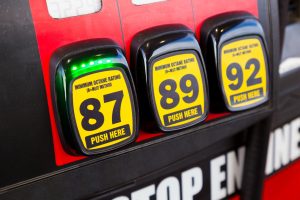MAKING THE GRADE: Which Octane is best for your car?
Posted September 26, 2017

When most drivers in Colorado fill up the gas tank, they probably select the cheapest price, paying little or no attention to the octane number. While cost is typically a major concern when purchasing gas, the lowest and cheapest octane can sometimes be the wrong choice.
What do the numbers on the gas pump mean and when does it matter anyway? Most people are aware that there are three grades of fuel offered at most gas stations, but what are the differences? The numbers on the pumps (85, 87, 92, for example) are the octane ratings. Each fuel is rated on how much it can be compressed within the engine before igniting. This means that gasoline with a higher octane can tolerate more pressure than a lower octane fuel can.
In a normal car’s engine, the cylinders combine and compress air and gas. After gas is compressed, a spark plug uses an electric spark to light the fuel. This is the process of combustion and it’s the driving force powering your car.
If, after filling up your tank, you notice any type of knocking sound coming from the engine, you may be using the wrong octane level. Combustion that’s not happening as it should be inside the cylinders is referred to as “knock” or “ping,” and can mean big problems for your engine. Knocking can occur as a result of gassing up with the wrong octane level. If you are concerned that this knocking sound is coming from your engine, it’s important to bring your vehicle to certified technicians at an auto repair shop as soon as possible.
Is there ever a circumstance in which using a high-octane level will help your car run better? The truth is that if your car requires fuel with an octane rating of 87, and you treat it to 92, you won’t really notice any improvement in the way your car runs. Speed and performance are determined by how the engine is constructed, not by the fuel you give it.
So, what’s the most important thing to remember regarding which octane to use? Use the rating that is recommended in your car manual and don’t waiver from it. Your car’s manufacturer has done all the necessary research and has calculated the exact octane rating your car needs.
Regular and preventative maintenance like frequent oil changes, flushing your cooling system, and keeping the fuel injector clean are also important factors in ensuring your vehicle’s health and will ensure your engine runs smoothly for years to come. Be sure to call our technicians at 303-347-1010 with any questions you may have on the best fuel for your vehicle’s make/model as well as to set up a regular maintenance schedule.
Categories: Car Care Tips
Tags:

